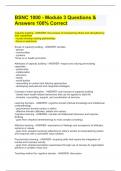Exam (elaborations)
BSNC 1000 - Module 3 Questions & Answers 100% Correct
- Course
- Institution
Capacity building - ANSWER- the process of empowering others and strengthening their capabilities - nurses develop trusting partnerships - focus on autonomy Scope of capacity building - ANSWER- families - groups - communities - systems *focus is on health promotion Attributes of capa...
[Show more]



